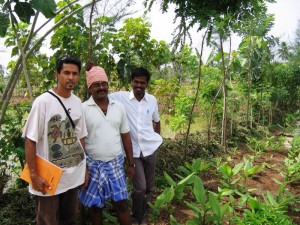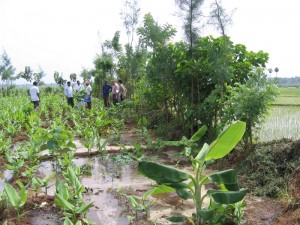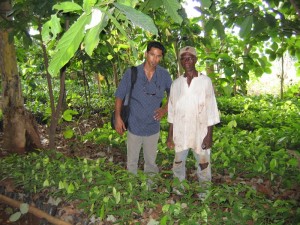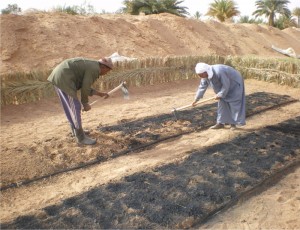Fighting Climate Change
Avoided deforestation and carbon sequestration with reforestation and agroforestry
Pro-Natura has demonstrated in Latin America, Asia and Africa that the vicious cycle of rural poverty, unsustainable agricultural practices, deforestation and accelerating climate change can be reversed.
Unsustainable agricultural practices are a major cause of deforestation and global warming. About 20% of greenhouse gas emissions – the equivalent of the emissions from all cars, trucks, planes and ships together – are caused by cutting down tropical rainforests. Pro-Natura promotes agroforestry, the system that increases productivity by combining crop cultivation and / or livestock in a forestry setting.
The opportunity is described by the Intergovernmental Panel on Climate Change (IPCC): «More than a million hectares would be suitable for conversion to high productivity agroforestry, with the potential to significantly reduce poverty and deforestation while sequestering carbon on a large scale».
For nearly 30 years now we have demonstrated the efficacy of agroforestry in Latin America, Africa and Asia where we have set up practical training centres for farmers. In particular we have developed innovative tree grafting techniques that double the yield of fruit and the first agroforestry handbook that is today available in both French and English.
Biomass energy or green charcoal
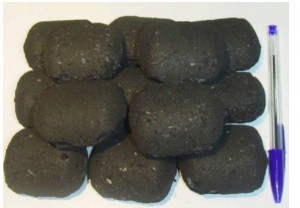 As a result of the rapid worldwide disappearance of forests, the two billion people currently using wood for cooking are facing a domestic energy problem. This is creating social problems and exacerbating deforestation, droughts and desertification. The use of wood as cooking fuel has another serious consequence: the World Health Organisation (WHO) estimates that 1.6 million woman and children die as a consequence of burning wood in badly ventilated homes (more than the death toll of malaria).
As a result of the rapid worldwide disappearance of forests, the two billion people currently using wood for cooking are facing a domestic energy problem. This is creating social problems and exacerbating deforestation, droughts and desertification. The use of wood as cooking fuel has another serious consequence: the World Health Organisation (WHO) estimates that 1.6 million woman and children die as a consequence of burning wood in badly ventilated homes (more than the death toll of malaria).
Pro-Natura is introducing a domestic fuel called “green charcoal” produced by an ecological process that carbonises organic materials not used for animal feed or soil enrichment. The result of 14 years of research and development, this green charcoal technology won Pro-Natura the Altran Foundation’s 1st prize for technological innovation with its pioneering pyrolysis unit, the Pyro-6F. This machine shows that it is possible to make a form of “green charcoal” from carefully selected and otherwise unused agricultural and/or forestry wastes in a highly ecological and efficient manner.
Our technology produces 4-5 tonnes of “green charcoal” per day using agricultural waste materials such as cotton stems, rice husks, coffee residues. It has now been transferred to a new Paris-based social enterprise, Green Charcoal International, which now constructs the Pyro-6F machines and continues R&D.
Biochar as a practical strategy for mitigating runaway climate change
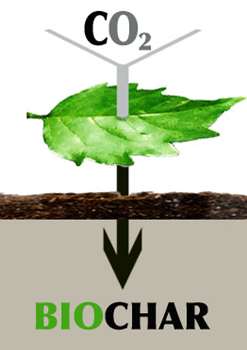 As plants grow, they draw down atmospheric carbon dioxide (CO2) to produce biomass that contains carbon. Rather than allowing plant matter to decompose and emit CO2, pyrolysis transforms around half of the carbon stored in plant tissue into a stable and inactive form of carbon.
As plants grow, they draw down atmospheric carbon dioxide (CO2) to produce biomass that contains carbon. Rather than allowing plant matter to decompose and emit CO2, pyrolysis transforms around half of the carbon stored in plant tissue into a stable and inactive form of carbon.
Thus whilst photosynthesis removes CO2 from the atmosphere, biochar stores carbon in a solid and beneficial form. Since the production and use of biochar can remove more CO2 from the atmosphere (by burying it in the form of a soil amendment) than is released, it is considered a carbon-negative technology. Biochar has also been shown to reduce emissions of other greenhouse gases from the soil, including methane and nitrous oxide (300 times more potent than CO2). A recent study has estimated that 12% of current annual anthropogenic greenhouse gas emissions could be reduced through biochar.
These biochar-rich soils can also be considered as true “carbon sinks”, absorbing and storing atmospheric CO. Each tonne of biochar can sequester around 2.7 tCO (or 27 tCO2e per hectare of land where 1 kg of biochar has been used per m2). Pro-Natura believes that carbon credits associated with the sequestration of carbon by adding biochar to soil will soon become internationally accepted.

